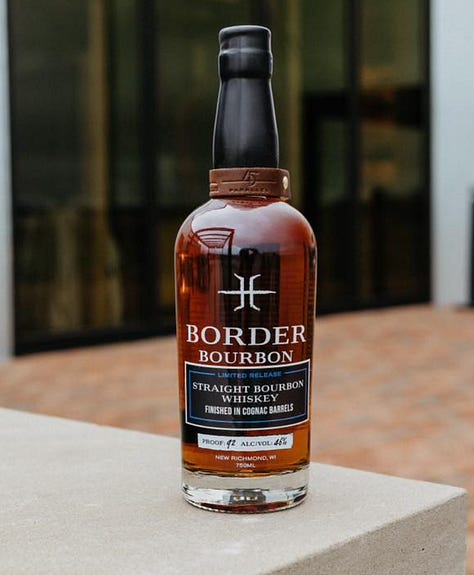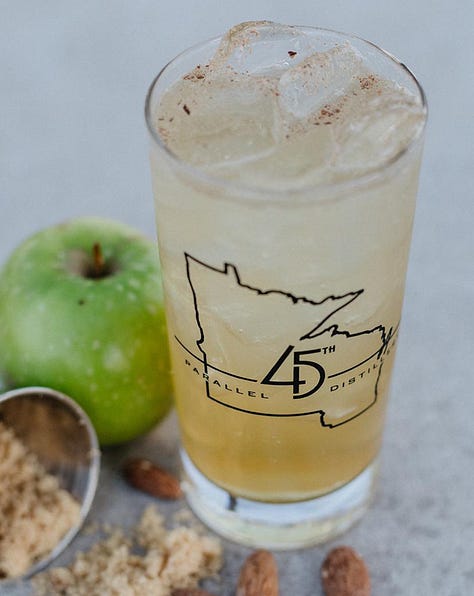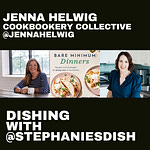Paul Werni and his son Anton created a grain-to-glass family distillery called 45th Parallel. With a production facility in Wisconsin but a cocktail room in Stillwater, they built their reputation by sourcing the best crops from a local farmers and convincing them to become suppliers. He runs a distillery production facility that has expanded into an event center, restaurant, and bar, representing half of his business. With his expertise in farming and cocktails, Paul has become a respected figure in the industry.



Stephanie [00:00:12]:
Hello, everybody, and welcome to the podcast. We are here with Paul Werney and Anton Werney, and they are the co-founders of 45th Parallel Spirits and Distillery. And they are located in New Richmond, Wisconsin. And in the meantime, they've opened a cocktail room in Stillwater, Wisconsin, and they make some very delicious products. I think the first product I ever had of yours was the vodka because obviously that's where most people start. Right. But you were like I felt like the second person that I heard use the term grain to glass, the first person being Gina Carver at J. Carver Distillery.
Paul [00:00:54]:
Yeah, we were the first distillery in the region. And at that time, I was a little naive. I thought that everybody started with the raw materials and actually made their own stuff. But that is somewhat rare with some disorders.
Stephanie [00:01:11]:
Yeah. And a lot of people will buy product and then make something with the byproduct, not unlike you see in the wine industry. Let's face it, very few people are actually growing their own grapes. They're buying grapes and then making their wine from that. But you guys really started with that grain to glass philosophy. And tell me about that. Like, literally seeing the grains and going, this is what I want to do.
Paul [00:01:37]:
Well, because of where we live, grain is what's available. You don't have a lot of fruits here or any other type of sugar sources, so you have to start with starches from grain, break them down. Fortunately, here in the Richmond, we're in a rural area, there's a lot of farmers here, so we have access to just about any grain that we want. And we get all our grain for our products is put on fire just on the road.
Stephanie [00:02:04]:
And did you know those people? And is that like, how did the first germ of an idea of like, hey, let's start making cocktail?
Paul [00:02:15]:
Well, as far as the farmer goes, I went to the local mills. When you have a farming community, you're going to have a mill. And so I went to the mills and I asked them who's going to have the best crops? And both mills gave me the same mail. And so I was able to convince that farmer to be a supplier. He's not a very large farm, about 500 acres, just a few employees, and that's it. As far as making cocktails, the industry, we started out as pretty much a production facility, and that's really what we are. However, the industry is changing. So small Distilleries really have to make money on site. So a few years ago, we added an event center, restaurant and bar. And now that's half of our business.
Stephanie [00:03:05]:
It'S not surprising to me because I did an event with you guys, and I've done lots of events at Distilleries, but I felt like you really has a loyal clientele. They were very into what we were doing that day. We did a bloody Mary tasting and also the whole restaurant side of it. You weren't just, like, offering Shakoori plates and had a food truck outside, like a lot of folks, you had, like, a full on restaurant, and the food was good.
Paul [00:03:33]:
Yeah. Well, I think you know who Scott Davis is, and he's and he's a friend of mine. We've known each other for 30 years, and he runs the kitchen over there, and he has a lot of experience in the Minneapolis area with running kitchens over there.
Stephanie [00:03:51]:
Yeah, it was clear that this wasn't and I don't mean to say that in a negative light, but for some folks, it's kind of an afterthought, right? They're trying to get you to stay around longer. They're trying to provide more amenities, but it wasn't what they started out to do. And you guys feel like you had an intentional way of going about that. And there aren't a lot of restaurants in that area. You're kind of in the middle of a field next to the liftbridge production facility, too, so I imagine people kind of come from all over.
Paul [00:04:25]:
We offer something different than a lot of the places in a small town. We have an Italian pizza oven, and we have a chef that has experience in the downtown Minneapolis market. We're not really trying to be your average and I don't mean this in a bad way bar food. We're trying to offer something different. New Richmond is a growing community. It's over 10,000 people now, and there are a lot of people in that region that are looking for something.
Stephanie [00:04:57]:
I really was impressed with your event schedules. You do a lot of events, but also they look fun and interesting and the kind of have a little twist to it. It seems like events are just a huge part of what you do to because your calendar is just full.
Paul [00:05:13]:
Yeah, there's a temptation to go with weddings, but weddings are a lot of work, so we wanted something different. Plus, being in a small town, you don't really have a lot of opportunities for, like, a comedy show, for an art show, stuff like that. That's what we're trying we're trying to bring in a variety of events to a small community so they don't have to drive 50 miles to get to.
Stephanie [00:05:37]:
Yeah, I liked it. Let's talk about so you've got the vodka, then you have a gin, and then you have referent, which is infused with horseradish. I'm assuming that came about because you're a big Bloody Mary guy in Wisconsin.
Paul [00:05:56]:
Actually, it came about when a couple of Russians came into our building in about 2009. And they have a place in St. Paul, Moscow, on the hill, and Russians like Porsche, so they asked us to make it, so we make it. And the son of the owner over there, he started his own business. And the are the owners of that brand. We don't own the brand.
Stephanie [00:06:23]:
Oh, so you just produce it?
Paul [00:06:25]:
We just produce it. It's funny you say because you were here for the Bloody Mary.
Stephanie [00:06:32]:
I was.
Paul [00:06:33]:
You said gin, horseradish vodka, and regular vodka. However, 90, least 90% of our production is whiskey.
Stephanie [00:06:44]:
Yeah. And you have three that you're selling on shelves that I am aware of. You might have some specials, too, or special barrel ages that you're doing.
Paul [00:06:55]:
We do. The three base ones are bourbon, rye, and our wheat whiskey. And each one of them has different finishes, different types of cast that we finish in. But those are our base whiskeys.
Stephanie [00:07:09]:
Which do you think is your best seller or know is your best seller? And is it the one that you like?
Paul [00:07:16]:
It is the one I like. It's bourbon and bourbon. By far, bourbon is the hottest whiskey out there.
Stephanie [00:07:24]:
Is it because people don't understand about wheat and rye whiskeys?
Paul [00:07:28]:
Yes. Well, it's some of it. I think the profile bourbon is going to be a little bit sweeter, and I think it's gonna be for the more the the general palate. Where is a rye whiskey? If a bartender or a brewer comes into our facility, they're going to sit down and say, I want a rye. I think it's a little bit spicier. I think of it as like a real strong cup of coffee. It takes a more advanced palate for it.
Stephanie [00:08:02]:
And then you also are contracted to brew or to make the Gamaliode aquavi.
Paul [00:08:10]:
Yes.
Stephanie [00:08:11]:
I love that product. It's very underrated. I think it's so complex and just makes such delicious cocktails. But again, it's a product that a lot of people have to sample it and get familiar with it because dill. Yeah, it's obvious in the Bloody Mary, but there's a lot of savory side cocktails that really can be delicious uses with that.
Paul [00:08:36]:
Yeah. Bartenders, especially in urban areas, love the Aquavites because they can do so many different things with them. There's a lot of great things out there that the general public just doesn't know a lot about. I try it once, but you have your meat, potatoes, you have vodka, gin, rum, and whiskey. All these other things like lacurs and brandy's and ODA bays. They have their audience, but it's a small audience.
Stephanie [00:09:15]:
I think that's why people like to go to bars, because I think they don't feel confident buying those products and experimenting with them at home. But the will take a chance on a cocktail at a bar.
Paul [00:09:27]:
Yes. The Aqua beach, it's kind of a different animal. I mean, if I were to go out to California or New York or any other state, they would be interested in aquaman. That's what they're looking for. They're not looking for vodka, they're not looking for gin. They can get those pretty easily. But that's something unique.
Stephanie [00:09:51]:
Yeah. And the flavor profile is different. And maybe because of the Scandinavian sort of story. There is a lot of story to it and you can get different variations. I know you guys have a holiday. And then there's the dill. And there's different versions too.
Paul [00:10:06]:
Yeah, there are. They each have a little bit of a different profile, but they all have that base dill.
Stephanie [00:10:17]:
I'm going to kind of switch gears just a little bit and ask a question about we're on the verge this weeks. Likely we're going to see the legalization of marijuana in Minnesota. Likely maybe we'll see the bills at the house. With that said, it feels to me like we're seeing a shift in younger people and that they're not drinking as much cocktails and beers and that they are adding this whole THC profile to their repertoire and to their going out, and it's creating a whole different consumer. And I wonder how distilleries will deal with that, because I know the breweries are creating THC products and seltzers. Will that be different for the distillery environment?
Paul [00:11:10]:
As of right now, we can't combine it with distilled spirits. I think a lot of small breweries might go into seltzers and that they can add it to, but has far as adding it to Baca, that's just not going to happen right now. But that whole movement, it hasn't affected us yet. I know it's affected wineries, it's affected breweries quite a bit. But spirits are still a growing category, the only one that's still growing.
Stephanie [00:11:52]:
Okay. Because I hope that continues to be the case. And certainly maybe there's room for everybody once we kind of settle out where the dust is going to land. And maybe too, I don't know. Is it time for some consolidation in the spirits industry, potentially?
Paul [00:12:09]:
Consolidation in the spirits industry? Well, it was an industry that was extremely consolidated when we started up. There were maybe 50 distillers in the whole country. All the growth has happened in the last 15 years, and now there's probably around 25 to 100 to 3000 distilleries. I know what you're saying. Like, breweries kind of got a little saturated. I'm not sure if distilling is there yet.
Stephanie [00:12:42]:
Okay. Yeah. And it takes such a maturation, too, of the product, right. Because many of where people shine is in the craft. And it takes a while to have a crafted whiskey, obviously, because of the length of time to make it vodka. I think there's craft in vodka, and I bet you think there's craft and vodka, but people underestimate the craft that's involved, right?
Paul [00:13:08]:
They do. I think you hit it on the head. It takes a long time for whiskey distillers to come out with good product. I would say five to ten years before a distillery really knows what they're doing and really can put out some well aged stuff. It's probably closer to ten because they got to make money and you start releasing stuff a little earlier, five. So we're just getting to the point where you have distilleries around the country, small ones, that started 1015 years ago that are coming, but with products that are capable of competing on a world stage. And so I think you're going to have really interesting and nice whiskeys popping up over the next five to ten years.
Stephanie [00:13:56]:
Do you think? We'll see the same with rum because it's a category I personally really enjoy, but it's hard to drink local craft rums because they're not great.
Paul [00:14:11]:
The thing is, it's the way whiskey was maybe seven years ago. A lot of young whiskey out there. You have a lot of young rum out there and servicing materials is a lot trickier and more expensive, too. Yeah, I don't know, at least for a startup distillery, it's a lot harder to jump right into that and sit on it and make it quality right away, where if you're already established and you can add that into your portfolio and sit on and not really rush it, you're probably going to come out. Well, there's another aspect to it. A lot of whiskey producers, a lot of the new ones have a lot of money, so they're able to produce and sit on it or buy, purchase well aged whiskey and put it out there in the market. They have large investors, a lot of cash flow. So you're seeing that in whiskey, you're not seeing that in rum. A lot of the rum producers, they're brand new, small micro distilleries. They don't have a lot of money, they don't need a lot of equipment to ferment it because it's a sugar base.
Stephanie [00:15:23]:
Right.
Paul [00:15:24]:
Fermentations are easy. Distillations are easy, but they need cash flow because they're not starting up with a lot of cash. They got to make cocktails with it, they got to sell it. That's why you're seeing so few. A lot of early ones are like super dependent on their cocktail room to make money. And so you want that rum right away to have a diverse cocktail.
Stephanie [00:15:44]:
Right.
Paul [00:15:47]:
We wanted to do forever, but just never really committed to it until recently. We are making rum, but you won't see it for a while.
Stephanie [00:15:57]:
Well, when it's time to see it, let me know, because that means it passed your muster, so I'll be interested in it. And I do think, like Skullvin Distillery, they made this Habanero white rum that stood out right away because it was so different and it is a different product because you can use it in cocktails and we put it in Bloody Marys too. It's different than most rums and for that reason we do buy it. But I'm waiting for the craft to come to that category because I think, like whiskey, you can really have a lot of nuance and there can be a lot of variety.
Paul [00:16:32]:
Well, it's going to take some time because I'll tell you what, in 2007, I went to a whiskey. I mean, I went to a Distillers conference and the theme of that conference was rum. The next wave. That was 15 years ago.
Stephanie [00:16:48]:
Okay. All right. I'll keep holding my breath over here.
Paul [00:16:52]:
There's definitely quite a few distilleries sitting on surround right now in Minnesota and Wisconsin.
Stephanie [00:16:59]:
Okay. All right. And I know the barrel age gins, obviously, are kind of a way to experiment with some new flavors there. Do you guys do a barrel age gin too?
Paul [00:17:08]:
We do, but it's not really distributed yet. Okay. There's a lot of things that we work on that we'll work on for a few years before we actually put them out.
Stephanie [00:17:19]:
Yes. And you are straddling not straddling the line, but you have businesses in both Minnesota and Wisconsin. I know you're not Soothsayers, but do you think that some of these breweries and moving into Wisconsin to increase production has put any fear of God into the Minnesota politicians, or is it just status quo, in your opinion?
Paul [00:17:41]:
It does. It needs to change. When we were submitting for our permits in Minnesota, the state was very helpful. They really wanted to make the process easy for us. Even. That being said, it was still much more difficult at doing Wisconsin. But their comments to me, they're the only one that's trying to move into Minnesota. Everybody else wants to move out.
Stephanie [00:18:12]:
Yeah.
Paul [00:18:13]:
I hope that they do learn something from that, because it is a good state. It is a good market. It should be a little easier. You shouldn't be losing your biggest distilleries.
Stephanie [00:18:28]:
We shouldn't.
Paul [00:18:29]:
Yeah. And you shouldn't be losing breweries. You got a significant brewery being built in Huntsville right now, sort of based.
Stephanie [00:18:41]:
All right. I know that means the answer is people are trying, but not hard enough, and sometimes it just takes some time. Right?
Paul [00:18:49]:
Yes.
Stephanie [00:18:50]:
Well, it's been really fun to talk to you guys again. I did an event with you, and I was really impressed with your staff. I thought your facility was great. And the people I talked to that were from the town that came to the event, they were like, such diehard supporters of you. They were sweet.
Paul [00:19:06]:
Well, we appreciate it, and thank you for stopping by.
Stephanie [00:19:09]:
Yeah, it was great. All right, have a good day. Thanks for spending time with me. I appreciate it.
Paul [00:19:15]:
Thank you.
Stephanie [00:19:15]:
All right, we'll talk soon. Bye.














Share this post